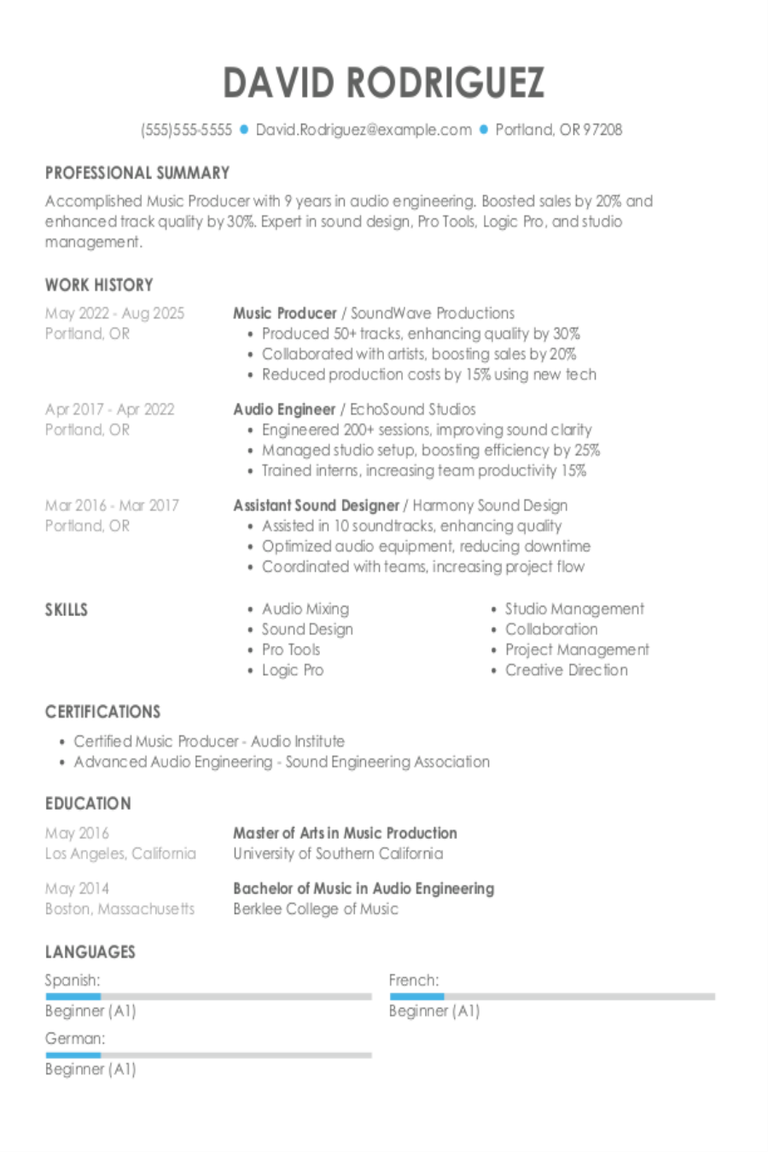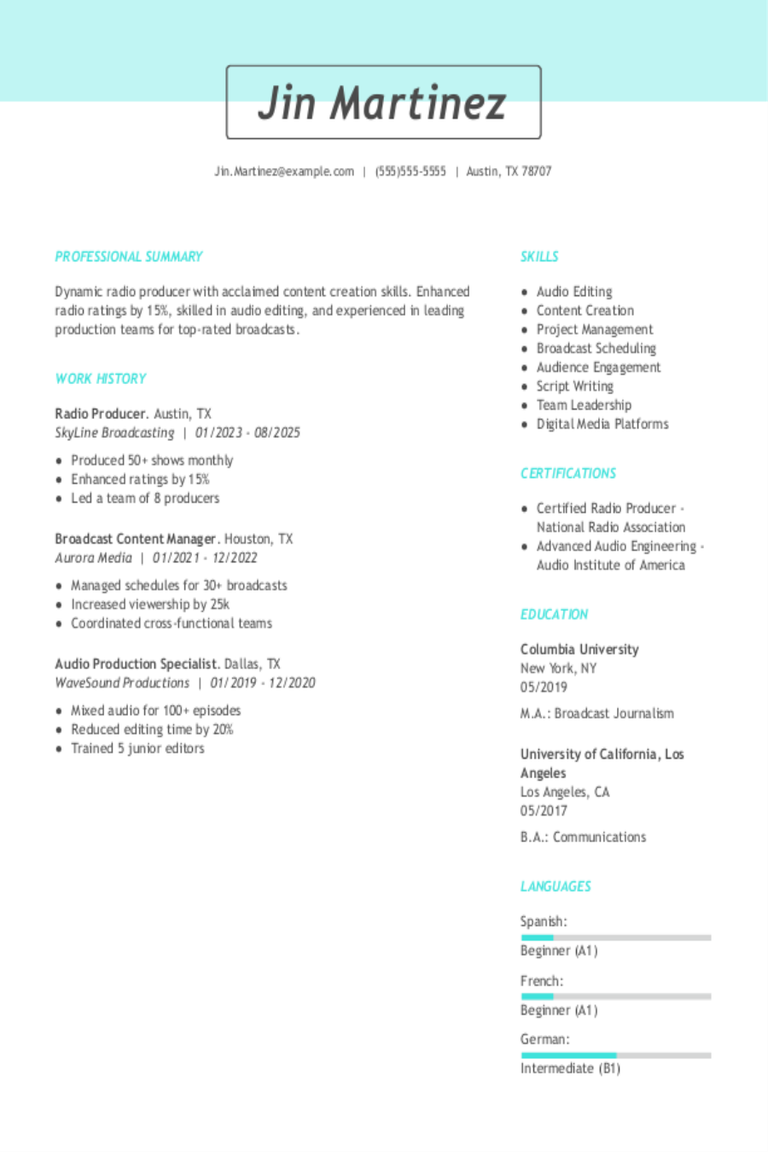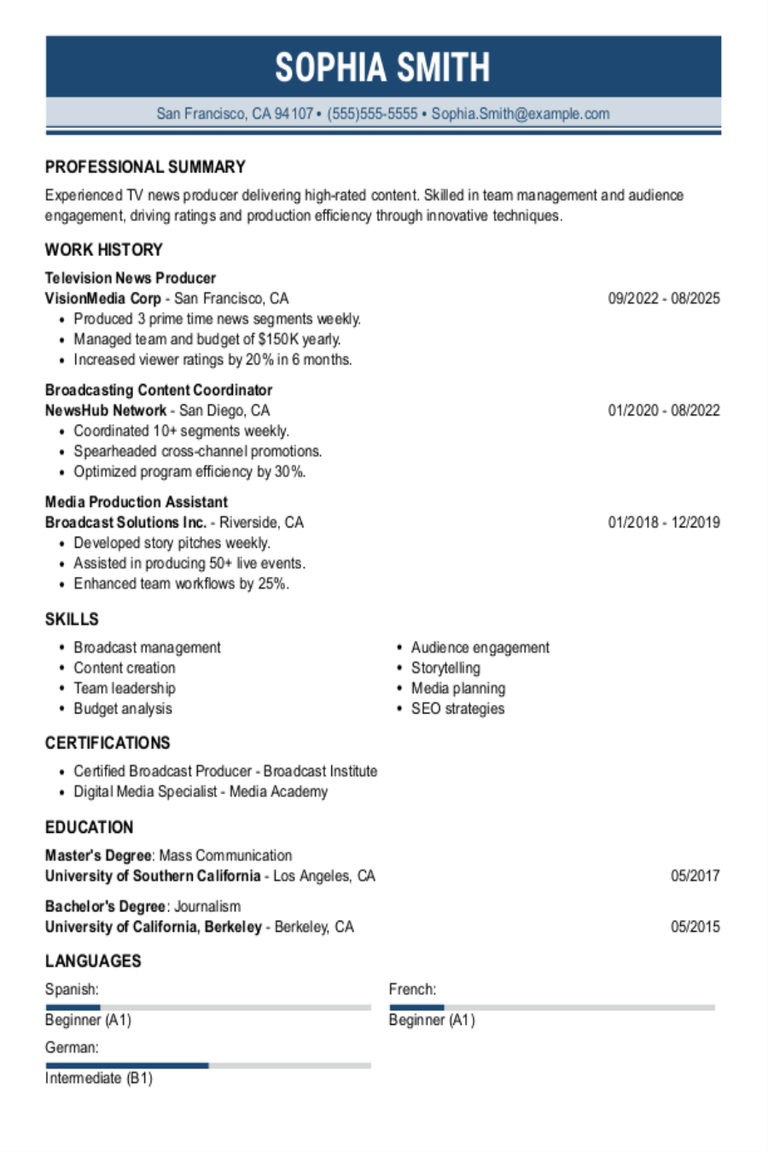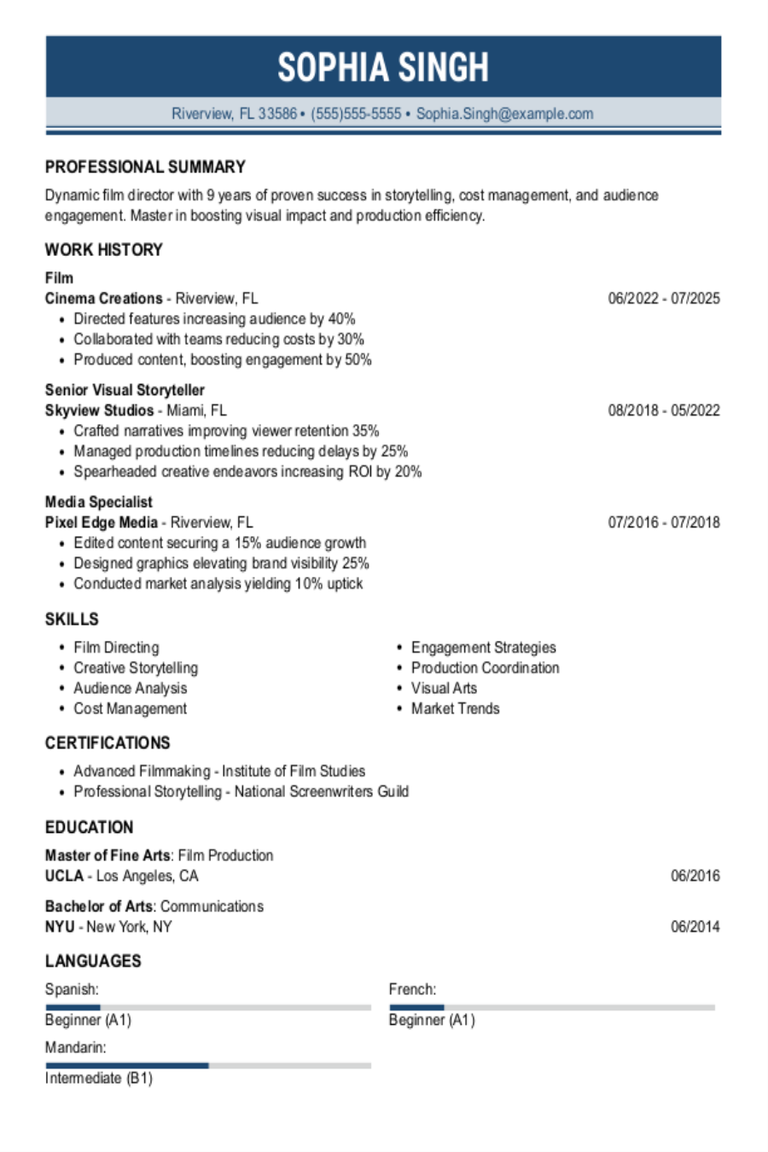Table of Contents
Get started with MyPerfectResume today!
- Build a resume on any device
- Pick an ATS-friendly template
- Tailor with AI copy suggestions
Why this resume works
- Quantifies accomplishments: By producing 5 films grossing over $50M worldwide, the applicant’s quantifiable impact on is evident.
- Uses action-oriented language: Action verbs like “produced,” “led,” and “increased” clearly convey the applicant’s initiative and effectiveness throughout their career.
- Highlights industry-specific skills: The applicant’s expertise in film production, script development, and post-production demonstrates a strong fit for industry roles requiring these specific skills.
More Film Producer Resume Examples
Check out our film producer resume examples to showcase your storytelling skills, project management experience, and industry connections. These film resume samples will help you create a resume that stands out in the entertainment industry.
Entry-Level Film Producer
Why this resume works
- Effective use of keywords: Strategic inclusion of role-specific keywords like “budget management,” “team leadership,” and “script analysis” optimizes the resume to pass applicant tracking systems (ATS) and showcase industry expertise.
- Puts skills at the forefront: Prioritizing skills such as film production and digital editing at the top reflects a skills-based resume format, ideal for emphasizing transferable abilities effectively.
- Shows digital literacy: Implementing tools like digital editing software and archiving systems demonstrates computer skills and readiness for tech-driven workflows in modern filmmaking.
Mid-Level Film Producer
Why this resume works
- Points to measurable outcomes: Achieving 20% under budget and $200M gross worldwide reveals the applicant’s knack for delivering measurable success in film production.
- Includes a mix of soft and hard skills: Balancing interpersonal skills with adept contract negotiation showcases a versatile approach to managing complex film projects.
- Demonstrates language abilities: The applicant’s language skills improve cross-cultural communication and adds depth to their filmmaking abilities.
Experienced Film Producer
Why this resume works
- Focuses on work history: By using a chronological resume, the applicant effectively showcases a solid career trajectory with roles demonstrating increasing responsibility in film production.
- Showcases impressive accomplishments: The applicant’s standout achievements, like launching a global festival partnership, reflect senior-level impact and are thoughtfully highlighted to show significant business contributions.
- Emphasizes leadership skills: With experiences leading teams of up to 50 professionals, the applicant’s leadership skills shine through managing high-budget productions and driving innovative projects.
Film Producer Resume Template (Text Version)
Aya Yamamoto
Cedar Valley, MN 55128
(555)555-5555
Aya.Yamamoto@example.com
Professional Summary
Dynamic Film Producer with 8+ years’ experience in cinematic production. Expert in budgeting, team leadership, and industry networking, producing multimillion-dollar films with global success.
Work History
Film Producer
SilverScreen Productions – Cedar Valley, MN
March 2022 – July 2025
- Produced 5 films, grossing over M worldwide
- Led a team of 20+ professionals in production tasks
- Increased efficiency by 30% with new workflows
Executive Film Advisor
Cinematic Innovations – Minneapolis, MN
February 2018 – February 2022
- Developed scripts leading to 3 award-winning films
- Managed budgets efficiently, saving 15% costs
- Coordinated cross-functional teams, enhancing synergy
Assistant Production Manager
NextGen Studios – Minneapolis, MN
February 2017 – January 2018
- Assisted in projects improving timelines by 25%
- Directed diverse casts in multicity shoots seamlessly
- Enhanced post-production speed by 40% via new tech
Skills
- Film Production
- Budget Management
- Team Leadership
- Script Development
- Project Coordination
- Post-Production
- Cross-Functional Team Synergy
- Industry Networking
Education
Master of Fine Arts Film Production
University of Southern California Los Angeles, California
June 2016
Bachelor of Arts Film and Television
New York University New York, New York
June 2014
Certifications
- Certified Film Producer – National Film Association
- Advanced Scriptwriting – Film Writer’s Guild
Languages
- Spanish – Beginner (A1)
- French – Beginner (A1)
- German – Beginner (A1)
Related Resume Guides
Advice for Writing Your Film Producer Resume
Dive into our tailored tips on how to write a resume for a film producer position and discover how to highlight your storytelling skills, project management prowess, and industry connections.
Showcase your portfolio or projects
Having a strong portfolio or project showcase helps you stand out in the artistic and creative world by showing what you’ve done and proven your skills. Your portfolio can include all kinds of projects like freelance work, school assignments, or personal side projects. These all show your ability to bring stories to life on screen.
If you have an online portfolio on platforms like Behance, Dribbble, or your own website, be sure to link it in your resume so potential employers can easily see your work.
When adding projects to your resume, treat them like job entries. Start with the project name and mention any client or company involved if there was one. Then highlight what you did and how it made a difference.
By organizing this information clearly, you’ll make it easy for anyone looking at your resume to appreciate what you’ve accomplished as a film producer.
Example of a projects section
Documentary Film Production: “Voices of the Wild“
Green Earth Productions
Feb 2022 – Aug 2022
- Oversaw the entire production process for a feature-length documentary exploring endangered species.
- Managed a team of cinematographers and sound engineers during on-location shoots across three continents.
- Coordinated post-production activities, including editing and color grading, resulting in a successful premiere at an international film festival.
“Urban Echoes” Short Film Series
City Arts Council
Sep 2021 – Mar 2022
- Produced a series of short films highlighting urban culture and community stories.
- Secured funding through grants and sponsorships to support local filmmakers and artists.
- Facilitated workshops for script development, improving storytelling skills among emerging talent.
Stuck on how to start your resume? Check out our professional resume examples and get inspired to make yours shine!
Emphasize your most relevant skills
As a film producer, it’s important to showcase both your technical and soft skills.
Technical skills like software knowledge can help you manage budgets, schedules, and film editing. Programs such as Final Cut Pro or Adobe Premiere are great to highlight in a dedicated skills section. Artistic abilities like storytelling and creativity should also be mentioned. These skills help bring films to life and keep audiences engaged.
Soft skills are just as important for a film producer. Leadership, communication, and problem-solving are key when working with diverse teams on set. These abilities ensure smooth production processes and help resolve any issues that arise.
To make your resume stand out, weave your skills into your work experience. For instance, mention how your expertise in a certain software helped streamline post-production or how effective communication led to successful team collaboration on a challenging shoot. This approach shows employers not only what you can do but also how you’ve applied these skills in past roles.
For film producers, a resume format that highlights project management skills, budget handling, and creative achievements can strengthen your candidacy.
Choose a professional resume template
When selecting a resume template for a film producer role, find one that mixes creativity with professionalism. A clean and structured layout highlights your skills and experiences without unnecessary distractions. Designs with clear headings and subheadings create a visual hierarchy, making it easy for hiring managers to quickly navigate your information.
Choose a format optimized for ATS compatibility, as many companies use these systems to sort resumes before they reach human eyes. This means avoiding overly decorative fonts or graphics that might not translate well through the software; instead, stick to simple fonts and clear section headings. Templates with bolded job titles and neatly aligned text can effectively highlight your achievements.
Remember the importance of balance; while you want your resume to stand out, it should showcase your work history and skills in an organized way. This approach communicates both your attention to detail and ability to present information clearly—important traits for any successful film producer.
Try the AI Resume Builder to make your film producer resume stand out. It offers easy-to-use templates that highlight your skills and experience.
Format your resume properly
Proper formatting plays a big role in making your resume readable and polished. For a film producer with experience, using a chronological resume format works well to highlight past roles in order, showcasing growth and skills. Keep it clean with clear headings and bullet points to make it easy to skim.
5 resume formatting tips
- Use clear section headings: Structure your resume with headings like “Work Experience” and “Skills” for clarity.
- Choose consistent fonts: Select a professional font such as Arial or Calibri in 10-12 pt size for uniformity.
- Implement bullet points: Use bullet points to present job duties and achievements succinctly.
- Aim for one page: Try to keep your resume to one page unless you have extensive experience.
- Ensure proper spacing: Maintain consistent spacing between sections for a clean, organized appearance.
Try our ATS Resume Checker to review your resume for over 30 common structure and content issues. Get instant advice on how to boost your resume score.
FAQ
Do I need to include a cover letter with my film producer resume?
Yes, including a cover letter with your film producer resume can significantly improve your application.
A cover letter gives you the opportunity to express your passion for filmmaking, highlight key projects you’ve produced, and explain why you’re drawn to the specific production company or project.
For instance, if a company specializes in indie films or has received recognition for innovative storytelling techniques, mention any relevant experience that aligns with their focus.
You can also use tools like online Cover Letter Generator to craft a compelling narrative that complements your resume or explore cover letter examples from fellow producers for inspiration.
How long should a film producer’s resume be?
For a film producer, aim for a one-page resume if you have less than 10 years of experience. Focus on showcasing key projects, production skills, and achievements that show your ability to manage budgets, timelines, and creative teams effectively. Keep it clear and impactful.
If you’ve been in the industry longer or worked on high-profile productions, a two-page resume is acceptable. Highlight major films or series you’ve produced, including awards won or box office success to showcase expertise.
Ultimately, ensure every detail serves a purpose—reflecting your career stage while keeping hiring managers engaged. Explore guides on how long a resume should be for more tailored advice.
How do you write a film producer resume with no experience?
To create a film producer resume with no experience, emphasize your skills, education, and any projects or activities related to film. Here are some tips for crafting a resume with no experience:
- Emphasize your education: Start by listing any degrees or coursework related to film production, like a Film Studies major or media-related courses. Include the institution’s name, graduation date, and any honors.
- Showcase transferable skills: Highlight skills such as project management, budgeting, scheduling, and team collaboration that are important for a producer role. These can be gained through school projects or part-time jobs.
- Include relevant projects: If you’ve worked on student films or independent projects, detail your role and contributions. Mention specific tasks like coordinating shoots or managing equipment.
- Highlight internships or volunteer work: If you’ve interned at a production company or volunteered on sets, describe those experiences and what you learned from them.
Rate this article
Film Producer
Share this page
Additional Resources

Music Producer Resume Examples & Templates
Explore music producer resume examples that show how to spotlight your creativity, technical skills, and collaboration experience. Find tips to craft a resume that highlights your ability to bring music

Radio Producer Resume Examples & Templates
Explore radio producer resume examples that show how to highlight your experience creating engaging content, managing schedules, and working with hosts. These examples and tips will help you showcase creativity

Television News Producer Resume Examples & Templates
Browse television news producer resume examples that highlight storytelling and production skills. Discover how to showcase your experience in managing news broadcasts and engaging audiences.Build my resumeImport existing resumeCustomize this

Film Resume Examples & Templates
Explore film resume examples that demonstrate how to effectively spotlight your creative projects and key experiences so casting directors and producers take notice.Build my resumeImport existing resumeCustomize this templateWhy this

Filmmaker Resume Examples & Templates
Discover filmmaker resume examples and tips to learn how to showcase your storytelling skills, capture creativity, and manage projects.Build my resumeImport existing resumeCustomize this templateWhy this resume worksQuantifies accomplishments: By directing

Film Crew Resume Examples & Templates
Explore film crew resume examples that emphasize teamwork, creativity, and technical know-how. These tips will help you showcase your unique skills and experiences to stand out in the film industry.Build
